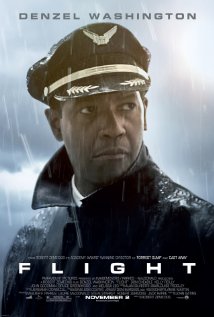THE AISLE SEAT - by Mike McGranaghan
"FLIGHT"

Flight is an addiction drama that manages to include all the usual elements of the genre while still finding a new context in which to put them. This is the first live-action film from director Robert Zemeckis in 12 years - Cast Away was the last one – and it's quite different from most of his pictures. There are some special effects and one majorly intense action sequence, but they're used in service of a rather intimate tale. Zemeckis specializes in grand spectacles like Forrest Gump, Who Framed Roger Rabbit? and the Back to the Future series. Flight finds him in a contemplative mood, and the movie is more powerful because of it.
Denzel Washington plays “Whip” Whitaker, an airline pilot with a substance abuse problem. After a wild night in a hotel room with a flight attendant, Whip shows up for duty loaded on booze and cocaine. Soon after takeoff, there's a malfunction that sends the plane into a nosedive from 30,000 feet. The co-pilot, Ken Evans (Brian Geraghty), begins praying. Whip, meanwhile, tries to pull the plane out of its downward spiral by rolling it over. Flying it upside down does indeed help him regain some stabilization, enough that he can crash land it into a field. All but six of the people on board survive. Whip is branded a hero.
Behind the scenes, investigators find evidence that he had substances in his system at the time. An attorney for the pilots' union, Hugh Lang (Don Cheadle), is brought in to defend Whip during an investigation hearing and to protect the airline from potential passenger lawsuits. Whip knows that he saved many lives with his actions. He also knows that what he did was reckless, heroic outcome or not, and he will therefore face jail time if the truth comes out. Initially, he decides that he's not going to drink anymore. He begins a romance with a recovering heroin addict named Nicole (Kelly Reilly). He seeks the validation of Evans and another surviving crew member. Sobriety doesn't come easily, though, and soon he's calling on his dealer (John Goodman) for more coke.
Most addiction movies focus on the exterior stuff – the bad behavior, the conflicts in relationships, the severest consequences. Flight is interesting in that it primarily deals with internal stuff, most notably the deep shame that comes with knowing one has an addiction that must be fed, even if doing so entails lying to one's family and friends or, even worse, getting them to lie for you. Written by John Gatins, Flight authentically captures the track (or, should I say, flight plan?) that addiction puts people on. We watch with a mixture of sadness and disgust as Whip denies the severity of his problem, tries to will it away, attempts to convince others it doesn't exist, and eventually is smacked in the face by the reality of it. Once he realizes the enormous toll his use has taken, there are damages that can no longer be undone.
Denzel Washington effectively brings the character's shame cycle to life, creating a man whose pain is always right under the surface. As the crash investigation goes on and the screws turn tighter on Whip, Washington adds new layers to his performance; he becomes a man in full-fledged panic, trying to come to terms with the demons that may ruin him personally and professionally. Admitting his problem is a threat to him, but having it exposed is just as much of a threat. In a career marked by superb work, Flight represents another milestone for Washington. Every drop of pain the character feels is made real by his sensitive, nuanced, unvarnished portrayal.
The plane crash scenario gives the story an especially gripping twist. The crash sequence is nail-bitingly intense, yet it also perfectly sets up the denial that all addicts experience. Whip correctly states that few, if any, other pilots could have pulled that little maneuver off. He saved lives. He also did it while utterly, irresponsibly wasted. Is he a good man who did a bad thing, or a bad man who managed to do something heroic? Flight leaves that for you to decide. The romance with Nicole feels a little forced (and that's no slight against Reilly, who's outstanding), but everything else is riveting as both character study and morality tale. One of the most devious aspects of addiction is that it turns its victims into Someone Else. They get lost and need to find their way back. Whip Whitaker is deeply lost. While in the cockpit, he avoids the dreaded “crash and burn.” In his life, the outcome is a lot less certain.
(![]()
![]()
![]() 1/2 out of four)
1/2 out of four)
Flight is rated R for drug and alcohol abuse, language, sexuality/nudity and an intense action sequence. The running time is 2 hours and 18 minutes.
Buy a copy of my book, "Straight-Up Blatant: Musings From The Aisle Seat," on sale now at Lulu.com! Paperback and Kindle editions also available at Amazon.com!


